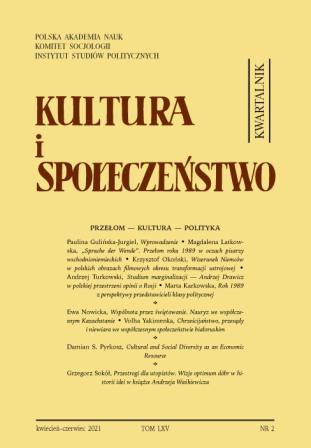Przestrogi dla utopistów. Wizje optimum dóbr w historii idei w książce Andrzeja Waśkiewicza
Warnings for utopians: Visions of optimal good in the history of ideas in Andrzej Waśkiewicz’s book
Author(s): Grzegorz SokółSubject(s): History of ideas, Polish Literature, Political Ecology, Book-Review
Published by: Instytut Studiów Politycznych PAN
Keywords: capitalism; utopia; human being; thing; future;
Summary/Abstract: The subject of this essay is Andrzej Waśkiewicz’s book Ludzie – rzeczy – ludzie. O porządkach społecznych, gdzie rzeczy łączą, nie dzielą (People–Things–People: On Social Orders Where Things Connect Rather Than Divide People). The book is the work of a historian of ideas and concerns contemporary searches for alternatives to capitalism: the review presents the book’s overview of visions of society in which the market, property, inequality, or profit do not play significant roles. Such visions reach back to Western utopian social and political thought, from Plato to the nineteenth century. In comparing these ideas with contemporary visions of the world of post-capitalism, the author of the book proposes a general typology of such images. Ultimately, in reference to Simmel, he takes a critical stance toward the proposals, recognizing the exchange of goods to be a fundamental and indispensable element of social life. The author of the review raises two issues that came to mind while reading the book. First, the juxtaposition of texts of a very different nature within the uniform category of “utopia” causes us to question the role and status of reflections regarding the future and of speculative theory in contemporary social thought; second, such a juxtaposition suggests that reflecting on the social “optimal good” requires a much more precise and complex conception of a “thing,” for instance, as is proposed by new materialism or anthropological studies of objects and value as such.
Journal: Kultura i Społeczeństwo
- Issue Year: 65/2021
- Issue No: 2
- Page Range: 157-167
- Page Count: 11
- Language: Polish

